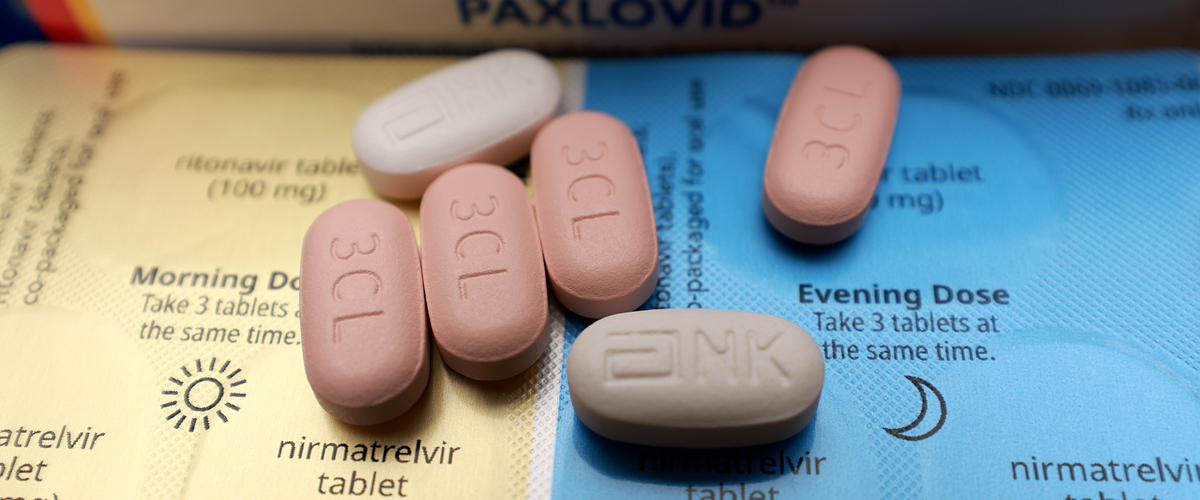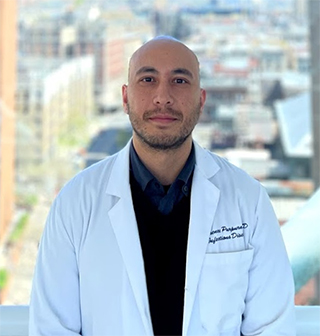What to Know About Paxlovid
An infectious diseases expert explains how the COVID-19 antiviral pills work and when people should consider taking them.

With COVID-19 cases rising and new subvariants circulating, people are taking extra precautions this winter to gather together safely. Fortunately, there are now more tools than ever to protect one another from COVID-19 — and to help treat symptoms for those who get infected. Among them is Paxlovid, an antiviral pill that reduces the amount of the virus that causes COVID-19 in the body and prevents symptoms from getting worse.
“At this point, I tell all of my patients who are eligible for Paxlovid to reach out immediately if they have COVID and get started on the medication,” says Dr. Lawrence Purpura, an infectious diseases specialist at NewYork-Presbyterian/Columbia University Irving Medical Center. “It can prevent severe disease, and there is growing evidence that it will have an impact on long COVID as well.”
Paxlovid is authorized by the FDA for people 12 years of age and older who have a COVID-19 infection and are at risk of severe illness and hospitalization.
Health Matters spoke to Dr. Purpura, who is also an assistant professor of medicine at Columbia University Vagelos College of Physicians and Surgeons and runs a clinic for patients with long COVID, about Paxlovid, who should take it, and how to get a prescription.
How does Paxlovid work?
Dr. Purpura: Paxlovid is an oral antiviral pill, taken twice daily for five days, which helps to stop the coronavirus from reproducing in the body. It is well tolerated and effective — in clinical trials it reduced the risk of severe disease by 88%. Paxlovid contains two medications (nirmatrelvir and ritonavir) which are part of a category of medications used for decades in HIV care, so we have years of scientific research and clinical experience with this treatment.

Dr. Lawrence Purpura
Who is it recommended for?
If you test positive for COVID-19 and have symptoms, are over the age of 12, and — most importantly — you are at high risk for severe illness, Paxlovid will significantly reduce the chances of hospitalization or death. The CDC has a broad list of underlying health conditions that would make you eligible, including cancer, diabetes, heart conditions, chronic diseases, and obesity. But it is not yet approved for everyone.
How can you get a prescription?
The best way to get Paxlovid is to ask your healthcare provider. It is available by prescription only and, for now, is free of charge through government programs. It’s best to start taking it as soon as possible after testing positive for COVID-19 and within five days of having symptoms. Paxlovid does have interactions with other medications, so a healthcare provider should review your medical history before prescribing it.
Are there medications that should not be taken with Paxlovid?
Unfortunately, drug interaction is a real problem because Paxlovid impacts liver function. The list of drugs spans almost every category — from cardiac medications to HIV antivirals to statins and blood thinners. It is therefore important to get a prescription under the guidance of a healthcare provider and weigh the risks versus the benefits.
What is “Paxlovid rebound,” and are there other side effects?
Some patients report having a metallic taste in the mouth. This also happens with other medications, and it stops shortly after stopping the Paxlovid.
More notable is the Paxlovid “rebound” that has been widely reported on but is rare. The rebound phenomenon is when there is a recurrence of COVID-19 after taking Paxlovid and recovering from the illness. We are still learning how many COVID-19 cases are a result of a Paxlovid rebound, but the good news is, there are no reports of rebound infections causing severe disease. A new study also found that COVID “rebound” was only seen in 1% of patients who took oral antivirals and was not associated with an increased risk of mortality. So the rebound phenomenon is not a reason to avoid taking Paxlovid, especially if you have risk factors for severe illness.
Can you take Paxlovid more than once?
Yes, if you are eligible and high risk, I recommend Paxlovid if you have a reinfection from a new variant.
Does Paxlovid prevent long COVID?
A lot of patients in my long COVID clinic are asking about Paxlovid. A new, large study, published as a preprint before peer review, followed 56,340 patients and showed encouraging results: The 9,217 patients who took oral antivirals within five days of testing positive were 26% less likely to report post-COVID symptoms 90 days after infection, compared with 47,123 patients who did not take it.
In my clinic, I have also treated many long COVID patients with Paxlovid who had a reinfection, and none of these patients had a relapse of long COVID or worsening of their symptoms.
But we are just beginning to understand what causes long COVID and how Paxlovid may help. One hypothesis for long COVID is that small amounts of the virus may be lingering in the body. Another is that the virus causes an overactivation of the immune system, resulting in inflammation that the body is unable to reverse or stabilize. In both of these cases, you could imagine it would be beneficial to decrease the virus in the body early on — which is what Paxlovid does. I am looking forward to more studies on this treatment in the near future.
Lawrence James Purpura, M.D., is a postdoctoral clinical fellow in clinical medicine in the Division of Infectious Diseases at Columbia University Vagelos College of Physicians and Surgeons. He is an assistant attending physician and leads a long COVID clinic at NewYork-Presbyterian/Columbia University Irving Medical Center, within the Division of Infectious Diseases. After attending Tulane University School of Medicine, Dr. Purpura was accepted into the Epidemiology Intelligence Service Fellowship with the U.S. Centers for Disease Control and Prevention (CDC) in Atlanta and was assigned to a branch that focuses on hemorrhagic fevers. The fellowship took him to West Africa, where he focused on the Ebola response and long-term complications in survivors. He has also completed a postdoctoral fellowship with ICAP, a global public health program at Columbia University.
